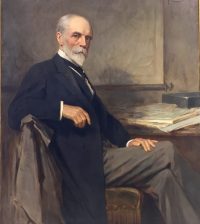The cold gave me a rather bad night of it, and work began in the morning almost before I was ready….
[Lawrence] Townsend, our Minister to Portugal, came in sharp at 10 o’clock on the invitation of Senator Davis, got introduced to the various Commissioners as they arrived, and spent half an hour talking about the attitude of Portugal during the war, the feeling towards America and towards the Spaniards, etc. The French papers this morning have changed their tone again. [They] publish some official statements from Madrid to the effect that the Spanish Commissioners are not going to surrender the points at issue, and deny that there is any dissension among them or in the Cabinet. [I] translated several of these articles for the Commissioners. We all concluded that a long paper would be the only immediate result of today’s meeting, and that we must soon be ready to put in our ultimatum, but that an elaborate reply to their last contentions would first be necessary…
We were a little late in arriving at the Foreign Office, but were still ten or fifteen minutes in advance of the Spaniards. They came in with profuse apologies for the delay, which had been unavoidable, and with rather more than their usual cordiality of manner. A little private discussion sprang up among a few of us, as to whether Judge Day ought to imitate Montero Rios’s expressions of sympathy over the news of the explosion in our Capitol by referring to the news we had seen in the papers of an alleged attempt upon his life by a Spanish crank. The final conlusion, however, was that as this grew out of a private quarrel in which a scurrilous pamphlet had been published against Montero, it might not be in the best taste to stir it up in a quasi-public way. Senator Gray was a little inclined to press the point, but Secretary Moore and I finally agreed with Day in advising against it.
The moment the protocols had been read in English and Spanish and agreed to, Montero Rios offered a paper which he said would serve two purposes, as a reply to the last paper filed by the American Commissioners, and as a counter proposition. He said that if the American Commissioners, after the arguments in the present paper had been fully considered, should still persist in their present views, he desired to call their especial attention to the suggestions made in the few last pages of the memorandum now presented.
Judge Day at once said that, in as much as the President of the Spanish Commission [Montero Rios] had called attention to that particular part of their paper, he would like—without manifesting any lack of interest in what preceded it—to have the part specially brought to their attention read now. Montero Rios assented at once to this, saying he knew, of course, the impossibility of taking time to translate the whole paper intelligently now.
Mr. Ferguson at once made a sight translation of the concluding pages in the Spanish memorandum. They proved [to be] a suggestion that if the question of the Philippines could not be agreed to by the two Commissions here, a settlement might be relegated directly to the two Governments. But . . . it would be more practicable and less objectionable if the meaning of the disputed passage in the protocol on that subject should be submitted to arbitration. Senator Davis, at the close of the translation, whispered to me that he considered it an extremely dignified and impressive This slideshow could not be started. Try refreshing the page or viewing it in another browser.
